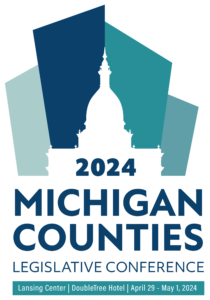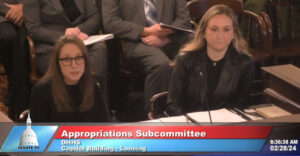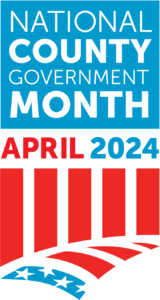Legislative Conference keynoter will address leadership in times of change
 Leading in times of crisis and change will be the theme of the keynote address at the 2024 Michigan Counties Legislative Conference, to be held April 29-May 1 in Lansing.
Leading in times of crisis and change will be the theme of the keynote address at the 2024 Michigan Counties Legislative Conference, to be held April 29-May 1 in Lansing.
Retired Adm. Peter Cressy, director of Executive Leadership Programs at the Washington Leadership Institute, will speak on:
“Washington, Lincoln, Roosevelt, Churchill: A Strategic Approach to Leading in Times of Crisis and Change: Washington and these other great leaders manifested eight common characteristics in leading during times of crisis and change, ranging from visibility and communication to planning and collaboration. This popular session will explore examples of these traits during the times of crisis each of these outstanding leaders faced, which remain relevant today.”
Registration is now open for the 2024 conference, with sessions at both the DoubleTree (formerly Radisson Hotel) and the Lansing Center. The event is co-hosted by the Michigan County Medical Care Facilities Council (MCMCFC).
Additional plenary sessions will feature:
- A discussion with the Legislative “Quadrant” (senior officials in the House and Senate)
- Remarks from National Association of Counties (NACo) President Mary Jo McGuire of Ramsey County, Minnesota
- MAC Legislative Update
- Remarks from MAC President Jim Storey of Allegan County
- Presentation of certificates to the 2024 graduating class of County Commissioner Academy
Breakout sessions on current challenges for county leaders, including broadband funding updates, lessons learned from the opioid settlements, impact of renewable energy siting legislation, options for infrastructure funding to address the expansion of electric vehicles and much more!
A Legislative Reception will be held on the evening of Tuesday, April 30.
Registration is online only and may be done by clicking here.

|
Member – Full Conference Rate | $425 |
|
Member – Two-Day Rate | $370 |
|
|
Member – One-Day Rate | $125 to $245 (depending on day) |
|
|
Non-Member – Full Conference Rate | $525 |
|
|
Non-Member – Two-Day Rate | $470 |
|
|
Non-Member – One-Day Rate | $165 to $305 (depending on day) |
|
|
Spouse Meal Package Rate | $225 |
The DoubleTree (formerly Radisson Hotel) is providing a special group rate of $142.95 for the event and is connected via the newly renovated pedestrian bridge to the Lansing Center itself. The bridge now offers improved lighting, new security systems, ventilation system and carpet.
Check-in is 4 p.m.; check-out is noon. MAC has designed the conference agenda to ensure attendees will have no issues in coordinating their schedules on check-out day.
The cutoff date to reserve your room is April 4, 2024. There is no guarantee that rooms will be available until April 4, so you are encouraged to reserve early.
For agenda details and other information, please consult the MAC website.
MAC briefs Senate panel on opioid settlement efforts
 MAC’s Amy Dolinky and Samantha Gibson testified before the Senate Department of Health and Human Services (DHHS) Appropriations Subcommittee on Wednesday to share the association’s work with counties relating to opioid settlement dollars.
MAC’s Amy Dolinky and Samantha Gibson testified before the Senate Department of Health and Human Services (DHHS) Appropriations Subcommittee on Wednesday to share the association’s work with counties relating to opioid settlement dollars.
The committee also heard testimony from DHHS and the Opioid Advisory Commission (OAC).
In her testimony Dolinky highlighted MAC’s role in providing planning and capacity building for opioid settlement funds. MAC has created a toolkit for local spending, resource center, resource library, local government learning community, informational webinars, and numerous other resources and templates for use by local governments.
Dolinky reported that 66 counties have engaged in some capacity with MAC’s technical assistance. Most counties have created steering committees to ensure stakeholder engagement, review local data and develop recommendations of priority areas where funds may be used to share with their boards of commissioners.
MAC has advised for intentional effort to include local voices in planning processes and decision-making, as well as long-term and sustainability planning efforts. Most counties have not yet spent funds, Dolinky explained, as they are focused on ensuring they understand the specific needs of their communities and the ways in which funds can be best leveraged alongside other funding sources addressing substance use.
Later that day, Dolinky participated in a media discussion on opioid settlement work with other health policy leaders in Michigan. To view or listen to that discussion, click here.
For more information on the opioid services, contact Amy Dolinky at dolinky@micounties.org.
 Counties enjoy 90 percent success rate in millage elections
Counties enjoy 90 percent success rate in millage elections
Michigan counties that asked their residents for revenue support this week achieved a 90 percent success rate, according to results collated by the Gongwer News Service.
Nineteen of 21 county-related millage requests (either renewals or increases) gained voter approval, a success rate of 90 percent, well above the overall rate of 83 percent for all millage elections this cycle.
Click here to see county results.
 ‘ForwardTogether’ is theme of 2024 National County Government Month
‘ForwardTogether’ is theme of 2024 National County Government Month
National County Government Month (NCGM), held each April, is an annual celebration of county government. Since 1991, the National Association of Counties (NACo) has encouraged counties to actively promote county roles and responsibilities in serving residents. Counties can schedule activities any time during the month. NCGM is an excellent opportunity for your county to highlight effective or innovative county programs and raise public awareness of services provided to the community.
This year’s National County Government Month theme is consistent with NACo President Mary Jo McGuire’s focus for the year, ForwardTogether.
ForwardTogether is about connecting, inspiring and leading – pillars of county government that build trust and drive towards solutions. Counties are encouraged to reflect on this theme as you choose how to celebrate NCGM. In particular, consider how NCGM is so intrinsically connected to the responsibility of county leaders to inspire our residents to take an interest in and engage with their communities, and how it presents an opportunity to lead in new and growing ways.
To download a toolkit from NACo for our NCGM activities, click here.
Counties to get $43.5M for marijuana payments
 Seventy-one counties will share in $43.5 million in revenue from the Michigan Department of Treasury for the taxes and fees collected in state fiscal 2023 under the Michigan Regulation and Taxation of Marihuana Act (Initiated Law 1 of 2018).
Seventy-one counties will share in $43.5 million in revenue from the Michigan Department of Treasury for the taxes and fees collected in state fiscal 2023 under the Michigan Regulation and Taxation of Marihuana Act (Initiated Law 1 of 2018).
The distribution rate for FY 2023 adult-use marijuana payments is slightly over $59,000 per licensed marijuana retail store or microbusiness. Each city, village, township and county will receive a payment based on the number of licensed marijuana retail stores and microbusinesses located within its jurisdiction as of September 30, 2023.
A listing of adult-use marijuana payments can be found in the following document:
For more information about distributions under the Michigan Regulation and Taxation of Marihuana Act, go to www.michigan.gov/revenuesharing. Questions regarding payments can be emailed to TreasRevenueSharing@michigan.gov or call 517-335-7484.
Forum will focus on mass shootings and local responses
 A forum to brief county and other local leaders on resources to prevent and respond to mass shootings will be held on April 17 in Lansing.
A forum to brief county and other local leaders on resources to prevent and respond to mass shootings will be held on April 17 in Lansing.
“School Mass Shooting & Critical Incident Preparedness Forum: The Role of Local Leaders” which run from 9 a.m. to 1 p.m. at Crowne Plaza Lansing, 925 S. Creyts Rd.
“The MSU and Oxford Village shootings have taught us that a school shooting can happen anywhere at any time. We owe it to our children to be prepared. Give the importance of this issue, former Dayton, Ohio, Mayor Nan Whaley (who responded to a mass shooting in Dayton) and Lansing Mayor Andy Schor will be keynote speakers. They will be joined by subject matter experts who will brief us on crisis communications, victim services, law enforcement training needs, school safety and available resources for county and other local leaders,” explained event organizer Sarah Peck of the Public Health Advocacy Institute at Northeastern University’s School of Law.
Registration link: https://www.chds.us/in/registration/?event=3355
Contact Peck at s.peck@phai.org for questions.
>div id=”ready”>
‘Fiscally Ready’ session will feature advice on budget work
 How to process and communicate your budget will be among the topics explored at the next “Fiscally Ready Communities” webinar on March 14.
How to process and communicate your budget will be among the topics explored at the next “Fiscally Ready Communities” webinar on March 14.
The Michigan Department of Treasury and Michigan State University Extension (MSU Extension) host these free trainings that are designed to assist appointed and elected officials with entry and intermediate level budgeting knowledge.
The March 14 session, which will run from 10 a.m. to 11:30 a.m. (Eastern), will feature:
- The budget process and communicating your budget
- Dealing with uncertainty in a changing economy
- Understanding key financial variables, such as:
- The “rainy day fund”/fund balance/net position
- Understanding how the tax base provides revenue
- Understanding volatile revenue
- Forecasting revenue and expenditures
- How to track your budget performance, including reviewing and amending your budget
- How spending in the present will have an impact on the future.
For more information about Fiscally Ready Communities, please check out the Treasury Fiscally Ready Communities webpage.
For questions, email TreasLocalGov@michigan.gov with the subject line “Fiscally Ready.”
Comment sought on best practices for underfunded retirement plans
 The Municipal Stability Board is soliciting feedback on February 2024 revisions to the Corrective Action Plan Development: Best Practices and Strategies document, which was originally issued in 2018.
The Municipal Stability Board is soliciting feedback on February 2024 revisions to the Corrective Action Plan Development: Best Practices and Strategies document, which was originally issued in 2018.
Section 8 of Public Act 202 of 2017 requires the Municipal Stability Board (the Board) to review and annually update a list of best practices and strategies that will assist underfunded local governments in developing their corrective action plans. At their meeting on Feb. 21, the Board approved an updated best practices and strategies document, which can be viewed at the Board’s website along with other documents at Municipal Stability Board.
The Best Practices and Strategies document includes the following three best practice principles: Plan Funding, Modern Plan Design, and Effective Plan Administration. It also includes detailed corrective action plan approval criteria, including underfunded status, legality, and affordability.
Any individual or organization that would like to submit comments should provide those comments in writing by March 15, 2024.
Comments may be submitted by email to LocalRetirementReporting@michigan.gov with the subject line titled, “Best Practices Comment: 2024.”
 Staff picks
Staff picks
- New CBO projection shows Highway Trust Fund status continues to worsen without congressional action (NACo News)
- Our key takeaways from the governor’s budget (Citizens Research Council of Michigan)
- Big Tech’s new rules of the road for AI and elections (Governing)
- How U.S. adults use TikTok (Pew Research)
